Brazil, Guatemala or Kenya are the sorts of exotic locations that most people would associate with the cup of coffee that kickstarts their day.
不論是巴西、危地馬拉還是肯尼亞,它們都是極具異域風(fēng)情的地方,多少人都會將它們與開啟新一天的一杯咖啡聯(lián)系在一起。
But increasingly it is Luxembourg that is providing the coffee business with an industrial shot of caffeine.
但是盧森堡逐漸成為為咖啡業(yè)提供工業(yè)咖啡因的地方。
JAB Holding, a private-investment company based there, has rapidly become the world's second-largest coffee retailer and roaster.
JAB Holding是一家總部位于盧森堡的私有投資公司,該公司已經(jīng)迅速成為了世界第二大咖啡零售商兼咖啡烘焙商。
On February 14th the firm, which looks after the fortune amassed in the chemicals industry by Germany's secretive Reimann family,
2月14日,這家照看由德國隱形萊曼家族在化工品行業(yè)累積的財富的公司
said it planned to list its coffee empire in a couple of years.
表示其計劃在幾年內(nèi)讓其咖啡帝國上市。
JAB has paid dearly to secure around 12% of the global retail market, second only to Nestlé, which accounts for a quarter of sales.
JAB以高價獲得了約12%的全球零售市場,僅次于雀巢,后者占市場銷售額的四分之一。
Italy's Lavazza, the third-biggest roaster, is tiny compared with the top two.
第三大咖啡烘焙商,意大利的LAVAZZA和前兩者相比顯得微不足道。
JAB has coughed up tens of billions of dollars since 2012 on acquisitions of retail brands such as Jacobs Douwe Egberts
自2012年以來,JAB已經(jīng)掏出了數(shù)百億美元用于收購多家零售品牌,如Jacobs Douwe Egberts

and coffee-shop chains including Peet's and, most recently, Britain's Pret a Manger, which it bought for 1.5bn pounds ($2bn) in May.
以及咖啡連鎖店,包括Peet's以及最近收購的英國的Pret a Manger,五月JAB以15億英鎊(20億美元)的價格收購后者。
The spending spree on coffee and other sectors could weigh on the group's balance-sheet.
咖啡和其他行業(yè)的消費熱潮對該集團(tuán)的資產(chǎn)負(fù)債表造成重壓。
Both Moody's and Standard & Poor's, two credit-rating agencies, recently warned that JAB's appetite for deals might lead to a downgrade.
兩大信用評估機(jī)構(gòu)Moody's以及標(biāo)準(zhǔn)普爾近期警告稱JAB對交易的欲望可能會導(dǎo)致降級。
Paying such frothy sums has also led JAB to stir up a "very traditional" supply chain, says Antti Belt of BCG, a consultancy.
支付如此大手筆的金額也讓JAB挑起了一種“非常傳統(tǒng)的”供應(yīng)鏈,咨詢公司BCG的安蒂·貝爾特說到。
Coffee companies, such as JAB, which process beans and then market
像JAB這樣加工咖啡豆,然后進(jìn)行宣傳
and sell them either in a packet or a cup, already grab most of the profits of the business.
并以袋裝或杯裝形式出售的咖啡公司,已經(jīng)占據(jù)了該行業(yè)大部分的利潤。
They buy raw beans from traders, who earn tiny margins—generally 1-2%—for much of the work.
他們從貿(mào)易商那購買生咖啡豆,這些貿(mào)易商費了那么大的勁也僅賺得了微薄的利潤(通常是1-2%)。
Roasters rely on traders' expertise to blend different beans to balance strength and body (often associated with Brazilian beans)
咖啡烘焙商依靠貿(mào)易商的專業(yè)技術(shù)將不同的咖啡豆相混合以平衡咖啡的濃度和觸感(通常和巴西咖啡豆相關(guān))
with flavour and acidity (from African or Central American ones).
以及其香味和酸度(來自非洲或中美洲的咖啡豆)。
譯文由可可原創(chuàng),僅供學(xué)習(xí)交流使用,未經(jīng)許可請勿轉(zhuǎn)載。












